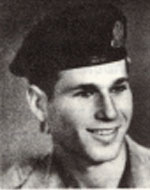Friedman, Amiram
Amiram, son of Rivka and Shmuel, was born on 17.4.1947 in Kibbutz Shefayim, where he studied at the elementary school in the kibbutz, and later completed his studies in the kibbutz high school, He was very active in the social life of his contemporaries, and since he was modest in nature, he did not try to stand out and was not inclined to talk about his successes. A workshop and a shop for decorative metalwork, he was also active in the Hanoar Haoved Vehalomed movement and participated regularly in the Gadna training. But he was especially fond of sports and especially liked playing basketball. At the kibbutz he was a member of Hapoel, and when he worked in the Egged cooperative years later, he played in the branch’s basketball team. His love for sport was so great that even the extra hours he worked and the concern for his wife and son did not prevent him from participating in all the team’s training and games. His basketball friends testify that he was an outstanding player and contributed greatly to the high level of the team. Amiram was drafted into the IDF in early August 1965 and volunteered for the Shaked commando unit, where he completed a course for Infantry Corps Commanders and Infantry Officers Course, at the end of which he was awarded the rank of Officer, completing the course only after the Six-Day War. At the time of the course, he was assigned to a reconnaissance unit, and at the time his commanders regarded him as an excellent person and as a superb combatant, as a commander with natural authority and disciplined command, a professional ability and leadership ability with genuine concern and closeness to his soldiers. Every day he was promoted to the rank of lieutenant, and before completing his compulsory service he asked to be transferred to the Armored Corps After completing his regular service he married and left the farm, first working in the copper mines in Timna and then working in the “Egged” cooperative, and he did not spare any effort to To ensure a strong economic future for his family, and indeed, shortly before the outbreak of the Yom Kippur War, he was accepted as a member of the cooperative, and his co-workers also noted his modesty and honesty as the most outstanding characteristics of his character. As he did his duties in the army quietly, almost in secret, so did his job in all his duties impeccably and responsibly. In the Yom Kippur War, Ami was among the first to be called to battle. He fought in Sinai as commander of the reconnaissance unit and took part in the braking battles and in the battles to establish the bridgehead in the central sector of the Suez Canal. On the evening of October 15, 1973, Ami was wounded and lost his eye. He bandaged himself, replaced the armored personnel carrier, and continued to storm the head of his platoon, and his APC was hit again after brutal fighting, and only then did he agree to be sent for treatment along with other wounded. On the way to the rear On October 16, 1973, the APC was hit by the “Chinese Farm” and all its passengers were killed. Amiram was brought to eternal rest in the cemetery at Kibbutz Shefayim. He left behind a wife and son, a mother and three sisters. After his fall, he was promoted to captain. In a letter of condolence to the bereaved family, his commander wrote: “His actions and perseverance in this long war served us as a source of strength for us, his comrades, and Amiram performed his tasks with great courage and resourcefulness.”
